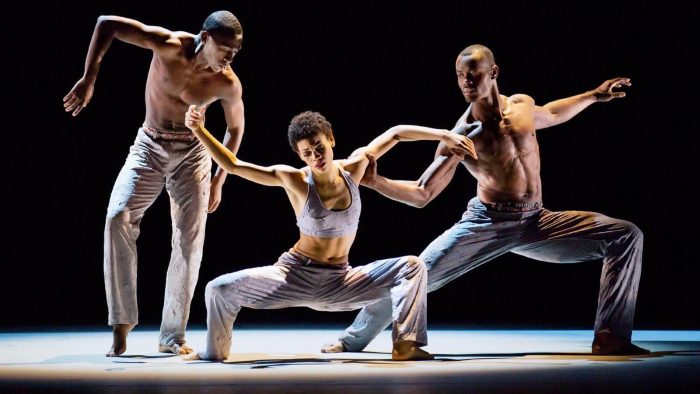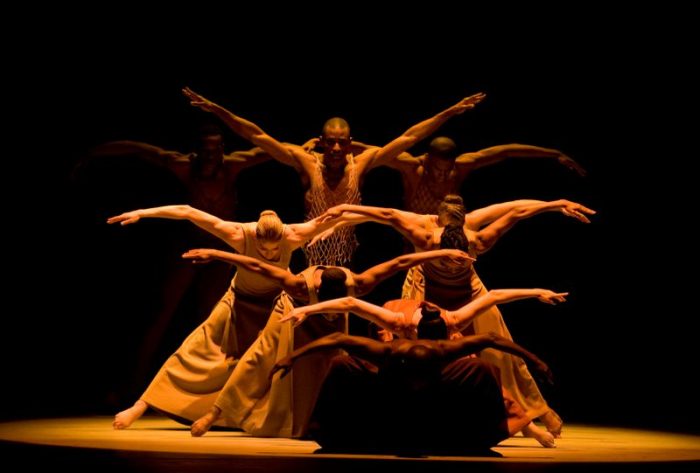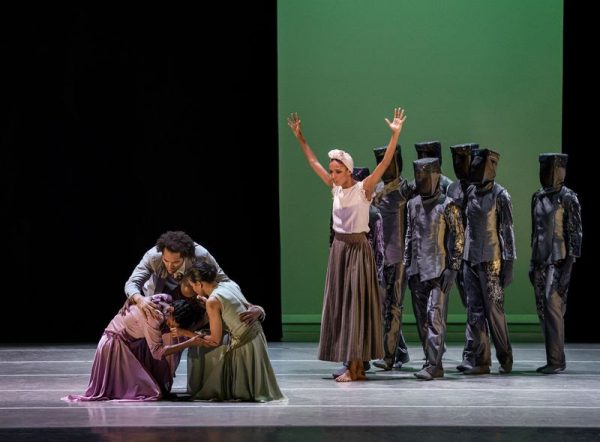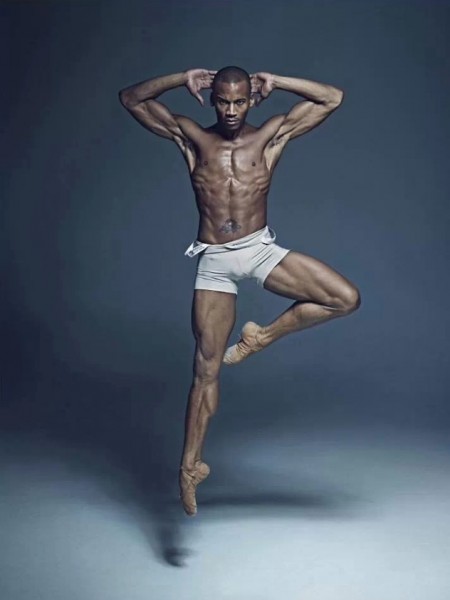Long after its namesake’s passing, Alvin Ailey American Dance Theater carries on his classic works and continues to create anew in his artistic legacy.
In the company’s stop at the Paramount on its national tour, the result is a showcase of diverse works (in energy, moods and messaging, as well as dance style) from different composers, with works spanning nearly six decades.
Some of the company’s work is viewable in clips online, which helps give a feel for the breadth and movement the works incorporate. The experience of the live event, however, is wholly different one — and watching on video, however beautiful the moves, gives little idea of the majesty and vivacity experienced in person.
The Paramount show was split into three works, by three different choreographers, in three acts. Each show will feature Ailey’s signature piece, Revelations (1960) as the third act, but Acts I and II on Saturday will be different than those in Friday’s lineup. (Friday’s lineup is repeated for the final Seattle show, on Sunday afternoon.) View the different lineups here, under the “Show Description” box.
The first piece in Friday’s lineup, Stack-Up (1982), was told through three distinct segments: a high-energy, full-stage (17-dancer) endeavor, using popular music, popular dance influences, and cliques in different costumes; the second a more mournful, wailing, longing tone; and the third a come-hither dance party. The totality suggested young lives in a crowded city, and the energy throughout was addicting.
Act II was a hard turn to the dark and deep, with Untitled America (2016). The piece shows the terror of mass incarceration on Black communities, as experienced from various sides: community residents and prison inmates under the constant watch of police forces and prison guards, respectively; the individual inmates counting down the time and the missed life events; and the family members and other community members left to pick up the pieces in the absence of yet another one of them. Although incarceration rates of women are on the rise, it remains overwhelmingly the Black men who are locked up; and several points of the piece were devoted to showings of strength, through powerful dances, from Black women.
Untitled America also brought to mind locally some of Spectrum’s recent powerful works, which center social injustices, including police brutality. (Find more on Spectrum here, and my review in Seattle Gay Scene of their most recent piece here; their next show is a collaboration between Donald Byrd and Beth Corning, on May 17-19.) Byrd, Spectrum’s Artistic Director and choreographer, was, fittingly, among the packed house at the opening night for Ailey.
Lastly, Act III featured Ailey’s own signature piece, Revelations, enduring and powerful 58 years after it was written. The piece calls out to the journeys — both emotional and physical migrations — of many generations of Black people, relying heavily on biblical imagery and spirituals to do so. It is told in three segments (“Pilgrim of Sorrow,” “Take Me to the Water,” and “Move, Members, Move”), each with different costuming and lighting that emphasize different tones of exuberance, salvation, sorrow, and bondage.
Written in 1960, Revelations was one of Ailey’s earliest pieces and remains the most famous and, reportedly, is “the most widely-seen modern dance work in the world.”
Ailey founded his American Dance Theater in 1958, to provide opportunities for Black dancers to excel. The company effectively set the standard for excellence in modern dance, and continues that standard now in its 60th year.
In addition to being a Black artist in 1958 (when Southern schools were still fighting to maintain segregation, and the North had plenty of its own problems of racial discrimination), Ailey was also a gay man, though he apparently was not out, at least by choice. Various sources on queer history (including Out History) report that when the AIDS crisis swept into New York in the late 1980s, Ailey was one of the many it stole away.
(Note: For upcoming theatre on the AIDS crisis, two options are Angels in America Part II: Perestroika by Tony Kushner, at UW Drama now through 5/12; and the remount of Marching in Gucci: Memoirs of a Well-Dressed AIDS Activist by Chad Goller-Sojourner, coming soon to Langston Hughes Performing Arts Institute over Pride weekend.)
Though Ailey was taken too soon, his artistry lives on, and strong. Ailey’s astounding staying power — evident in his own work, his inspiration to other choreographers and dancers, and his company’s legacy — can’t be captured in one show. But it was summarized beautifully in the 2.5-hour evening of extraordinary movement at the Paramount.
If you can, be sure to catch it this weekend.
Alvin Ailey American Dance Theater runs through Sunday (4/29), with shows on Saturday at 8 pm and Sunday at 2 pm. Tickets still available, at $35+, online here.
Additional Black excellence in dance this weekend includes Black Bois, by Dani Tirrell, at On the Boards. The full run is sold out. If you want a shot at the door/waitlist, be there at least an hour before show time. Tickets $30; info here.



















